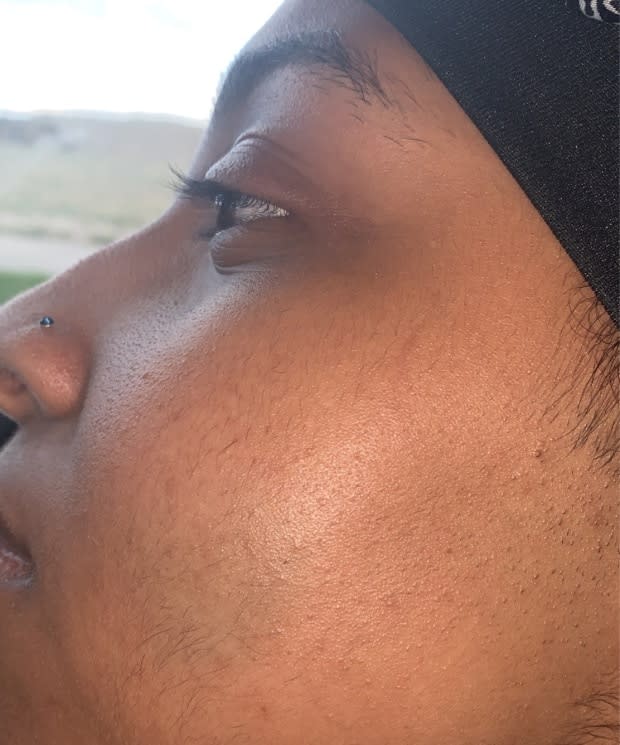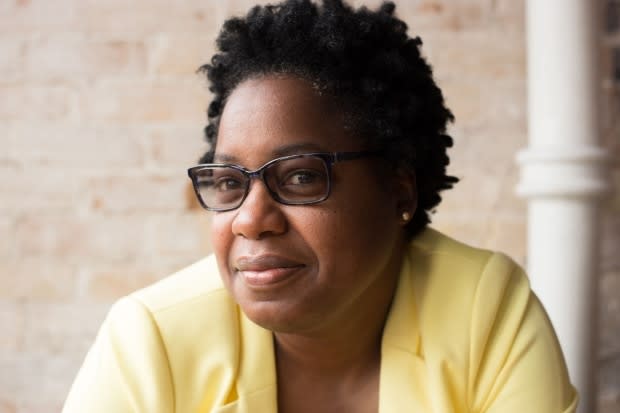Police investigate video of woman choked by stranger before Calgary Black Lives Matter event

Police are investigating an altercation that a group of young Black Lives Matter protesters in Calgary say began with a stranger calling them the N-word and ended with the man grabbing a young Black woman by the neck.
The incident, some of which was captured on video, shows the need to address systemic racism both in the community and in policing, according to an academic who studies racism in Canada.
"When, in the particular culture of the current environment where race issues — and particularly the Black-white police relationship is in such tension — it strikes me as concerning the officer acted the way he acted in the current environment," Kathy Hogarth, an associate professor of social work at the University of Waterloo, said.
Rayan Babiker said she and four friends were driving around Sunnyside in northwest Calgary at around 2:40 p.m. on June 3, looking for parking before they planned to meet a friend and head to a Black Lives Matter vigil downtown.
One of the women in the car had been holding a Black Lives Matter sign up to the window and shouting the motto as they drove, usually to honks or waves from passersby.
The women said they drove past a white man engaged in what appeared to be a heated conversation with a Black man. The woman in the car yelled "Black Lives Matter" as they drove past and in response they said the man yelled back, "Shut the f--k up, [N-words]."
The women shouted back "f--k you" and other expletives at him, and drove on.
'We were shocked'
"We were shocked. Yes, we've experienced racism, but never in broad daylight, and this man felt this was a safe environment for him to say that," said Babiker.
The women found parking and were walking to meet their friend when they came across the man again, in a different spot than the direction he had been walking. They said it seemed as if he had walked toward where they had parked. At this point, they start recording video on their phones.
The women confronted him, daring him to repeat what he had just shouted at them.
"You were so keen on calling us [N-words] when we were in the car, how do you feel now?" one of them asked, while others shouted, "Black Lives Matter."
The man swore at them and began to walk away when one of the women splashed water from a water bottle onto his back, wetting the left sleeve of his polo shirt.
The man spun, lunging and grabbing 20-year-old Fatima Osman — who hadn't thrown the water — by the neck.
Watch an edited excerpt of cellphone video of the altercation below. CBC News has blurred the face of the man because police have not confirmed his identity or charged him. CBC has also bleeped out profanity.
"Some water got thrown at him, I'm not sure what happened because it was behind me," she said.
"He got angry. He choked me and he punched me in the face …. I tried to grab him and do something to defend myself but he ran away."
CBC News has not been able to confirm the identity of the man in the video and has blurred his face in the video as he's not currently facing charges.
A company, the logo of which is shown on the man's shirt, confirmed he is a former employee but said due to privacy legislation it was unable to comment further as to when the man left the company.
"We are deeply saddened to be associated with this in any way as we do not condone racism or violence under any circumstance," a company spokesperson said in an email.
Osman said she was hit in the face and a necklace of sentimental value to her was torn off. She shared a photo with CBC showing her bruised cheekbone.
"My face for a whole week after that, the side he punched, the left side was green and swollen. Even now it's kind of green and it kinda hurts when I touch it."

The video's shaky, but as it resumes, it shows Osman pushing back at the man and grabbing his shirt, and the women trying to chase the man off, as he lunges in what the women said seemed to be an attempt to tear off the hijab of another woman in the group, before running off down the street.
Police arrive
They followed him, yelling at him and continuing to film. They were about to call the police to respond when they spotted a police officer driving up.
Babiker said they had planned on following him until they could get authorities to respond, so they were relieved to see a police officer.
The women, yelling over each other, told the officer variations of the same statement, "He hit her, we have it on camera."
The officer spoke with the man first, motioning to the women to calm down and give him some space. He asked the man for his ID, then told the man he could walk away before speaking to the women.
"We were all trying to say the same thing, but he felt like, I don't know, we weren't listening to him, he went to the offender here ... we felt like we wasted our time following this man around trying to get justice," said Babiker.
A female officer arrived a few minutes later and, after calming the group down, listened to their accounts of what had happened.
Professor troubled by police response
Hogarth, author of A Space for Race: Decoding Racism, Multiculturalism, and Post-Colonialism in the Quest for Belonging in Canada and Beyond, said she was troubled watching the video, seeing the officer let the man walk away before trying harder to obtain the women's perspective of what happened.
The Calgary Police Service said that, when coming across heated confrontations, it's common practice to separate parties to de-escalate a situation.
"Given the man was alone, it was easier to speak with him and send him on his way. Officers obtained his identification and followed up with him shortly after," an emailed statement from police read.
Osman said while she understands why the officer spoke with the man who hit her first, she felt disregarded.
"I understand that their protocol is to go to the person who actually punched," she said.
"At the same time, we were five young girls in distress, I had just told you this man punched me."
Osman and her friends said they have since met with police to provide statements about what happened.
Osman said the detectives were kind and helpful, and she's hoping for justice, but she was concerned by one question an officer asked her.
She said police asked her why it was OK for her, a Black woman, to use the N-word, but when a white man used the same word she got angry.
"It was frustrating," Osman said, adding that when she uses the word, she's not using it with hate or as a slur against other Black people.
Police confirmed they are actively investigating the incident and said they cannot discuss the matter as it may eventually be before the courts.
"The file is being thoroughly investigated including interviews with those involved to gain full context and perspective before completing the investigation and consulting with the Crown," an emailed statement read.
Police said if anyone involved is dissatisfied with the investigation, they are encouraged to file a complaint through the Professional Standards Section.
Our system is not working for all of us ... until it works for all of us, it is not working for any of us. - Kathy Hogarth, social work professor
Babiker said this incident has changed her relationship to the police.
"I actually see the police as people who can potentially protect me but after [this] incident, that the only time I actually called them in and wanted their assistance, they failed to deliver ... since I had [this incident] on video, I thought I had the upper hand here," she said.
"It had me think maybe next time I shouldn't say anything or even try to ask for help or defend myself."
Hogarth said Babiker's reaction to her experience should resonate with Black, Indigenous and people of colour across the country.
"This is exactly what happens when victims of crimes cannot trust the system in place through experience, whether that's direct experience or vicarious experience ... but when victims cannot trust the systems that are in place to protect them will actually protect them, those victims are forced to suffer in silence," Hogarth said.

"We have strayed very far from the model of serve and protect because we serve and protect only a certain class of citizens ... we need change.
"Our system is not working for all of us ... until it works for all of us, it is not working for any of us."
Hogarth pointed to recent comments by Calgary's police chief, who said he used to think systemic racism was not a problem in his force but that now he is not so sure.
Hogarth said the growth in that statement shows the dial is moving but perhaps not quickly enough.
"Systems that are absolutely built on racism are absolutely trying to deny the existence of it. We cannot begin to address systemic racism when those who hold responsibility for those systems deny the existence of it," she said.
"Until it becomes in the best interest of leadership to see the problem under their rule, under their responsibility, until it becomes in their best interest to see those issues, we will need change."

